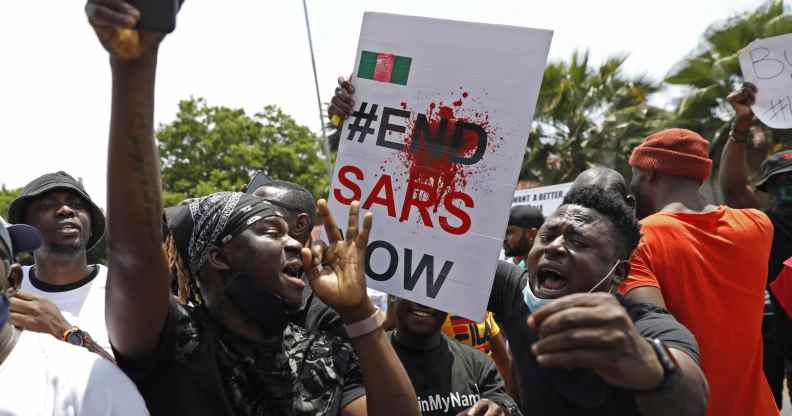UK government finally admits it trained and equipped Nigeria’s homophobic SARS unit

Nigerians protesting against the brutality of SARS (Phill Magakoe/AFP/Getty)
The UK government has admitted to providing training and equipment to a notorious police unit in Nigeria that routinely persecuted members of the LGBT+ community.
The Special Anti-Robbery Squad (SARS) has a long record of horrifying abuses, including the routine intimidation, harassment and attacks of peaceful protesters. It has also been accused by Amnesty International of torture, extrajudicial executions and many other human rights violations.
After previously denying any ties to the brutal unit, the UK minister for Africa James Duddridge has finally admitted that British officials did in fact train and supply officers.
In a letter sent to Labour MP Kate Osamor on Thursday, the minister said SARS officers participated in training which he claimed was “designed to improve human rights, training on public finance, and community policing workshops”. He also confirmed radio equipment was given to Nigerian police which was then used by SARS.
“It is shocking that in the middle of global protests to End SARS our government appears to have had no idea whether or not it was funding those very units,” Osamor told the Independent.
The MP said she had been told “categorically” by the minister earlier this month that no funding ever made its way to SARS units. “The government has now been forced to admit that it not only spent millions training SARS but also directly supplied them with equipment,” she said.
“The government now needs to explain how and why it ever felt it was appropriate to train and equip security forces which were known to have taken part in torture and extra-judicial killings,” she added.
On 19 October the Minister for Africa @JamesDuddridge assured me that the UK Government had provided no funding to SARS units.
That wasn’t true. The Minister has now confirmed that the Government has trained and supplied equipment to SARS units from 2016 to 2020. #EndSARS pic.twitter.com/uDACZ1OHXL
— Kate Osamor| Labour – Co-operative MP| Edmonton || (@KateOsamor) October 29, 2020
Calls to end SARS have been ongoing in Nigeria for years, but a new wave of protests began in October after footage of an officer shooting a civilian went viral online. The situation escalated last week when armed forced opened fire on protesters at Lagos’ Lekki tollgate, killing at least 12 people in a shocking display of police brutality.
The massacre triggered an outpouring of grief around the world and resulted in SARS being officially disbanded – though activists suspect the move is merely symbolic.
SARS targets the LGBT+ community in Nigeria.
Amnesty International says SARS appears to mostly target men between the ages of and 35, mostly from low-income backgrounds and vulnerable groups.
Among these groups is the queer community. Matthew Blaise, a non-binary LGBT+ activist in Lagos, previously told PinkNews that gay men – especially those who present femme – “are one of the primary targets of the police” in Nigeria.
Butch lesbians are also harassed and trans people are similarly targeted, though Blaise notes that Nigeria “doesn’t really have the language” for trans identities.
Describing their experiences with SARS, Blaise recalled being stopped by four armed officers because they were “walking like a woman”. When they asked what crime they had committed, they were told it was “perceived homosexuality”.
When Blaise refused to open their phone, fearing it would be used to blackmail them and track down other LGBT+ people in their contacts, they were dragged by the hair, pushed into a police van and detained.
They were eventually allowed to leave after police grew tired of bullying them, but other queer people have not been so lucky. Incidents like this are sadly all too common in Nigeria, a country widely regarded as one of the most homophobic in the world, thanks in part to its colonial-era sodomy laws.
“It is sad because we are protesting about oppression,” Blaise said. “But there are [protesters] out there who wouldn’t think twice about killing us because of our sexual orientation and gender identity.”
Siana Bangura of the Campaign Against Arms Trade told the Independent: “The UK should not be exporting violence, an ongoing expression of colonial practices, whether it is in the form of weapons or training. The current policy of support and collaboration risks providing moral cover for those that commit abuses.”

